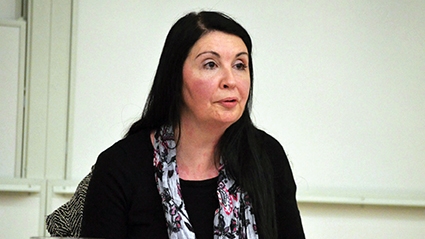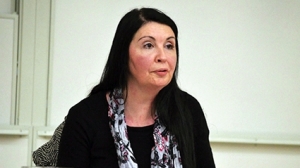Amanda Paul: EU Enlargement Capacity at All Time Low
Around 100 international and Georgian experts and opinion-makers took to Holiday Inn last week to attend the South Caucasus Security Forum organized by the Georgian Rondeli Foundation. Panorama TV show and GEORGIA TODAY spoke to Ms. Amanda Paul, distinguished analyst and journalist who has covered the South East Europe extensively throughout the years.
War in Ukraine, creeping occupation in Georgia and a pro-Kremlin president in Moldova vs association agreements and visa liberalization. What should we expect next in the Eastern Partnership?
The Eastern Partnership at the moment is all about different relations between all the different countries involved in it. At the beginning, when it was inaugurated, there was some unhappiness from the Russians who saw it as an encroachment on what they consider to be their special sphere of influence. Historically, Russia has always viewed this region as a buffer protecting it from its enemies. But in this case, there is an additional element, because Russians would like to see the demise of the EU. From the perspective of the EU, I think the most important thing is to continue to support those countries focused on the European future: future as a full member, integrated into Europe and encompassing European values- Georgia, Ukraine and Moldova. From these three, Georgia is the most advanced when it comes to integration and reform processes. At the same time, however, the EU needs to change its narrative towards the Russian Federation, indicating that they fully support the countries that want to integrate into the EU by giving them some sort of clear perspective of what is at the end of the road. I doubt it would be a membership prospect, but sending a different message that the Russians could understand would mean that the EU won’t tolerate Russian attempts to “veto” further enlargement of the EU in this part of the world.
With the majority of Georgia in favor of European integration, the Georgian people would like to know the West’s take of them – are they viewed as real Europeans?
When you talk about Georgia with an average person, he might first think about the US state of Georgia, because that’s what comes up when you Google “Georgia”. But I guess the more informed person would have a positive attitude. He might not be able to locate Georgia or the South Caucasus altogether on the map, but I suppose a European “in the know” would realize that Georgia is a European-oriented state. Apart from that, though, the people do not really have much of an idea about the country, its economy or the social situation. Many people would also say, “It’s part of the Soviet Union, Russia’s backyard,” etc. In today’s climate, if you asked a European citizen if he wanted Georgia to join the EU, he would probably say no, because at the moment the capacity for expansion and the capacity of the EU to accept new members is at an all-time low.
What do you see in the short- and long-term perspectives with regards the occupied territories in Georgia?
I think we have to be frank here: Georgia having its territorial integrity restored is not going to happen in the near future. It’s a difficult thing to achieve. I think a key to it is building a strong and prosperous state with a good economy, rule of law and no corruption: key values that will make the country more attractive, because a Georgia that is only half-reformed and suffering from high unemployment is not going to make the population of the occupied territories feel any different about reintegration. Another challenge is the never-ending propaganda campaign from the Russian Federation, which is difficult to counter in such an isolated environment due to lack of awareness and contact with the European Union among the local population, apart from with the Russian version of it. So, this is going to remain a key challenge. However, steps like Georgia receiving visa liberalization are always reciprocated by the Kremlin in one way or another, mostly by trying to bring Georgia closer to Russia via reintegration or through events like [the referendums and visits happening recently in the occupied regions]. This is all very negative, and, unfortunately, the international community and the EU do not have any policy to counter this.
You have written extensively about Cyprus, where, after more than 40 years, they are very close to negotiating a reunification. Many would say this is because of Cyprus’s EU membership benefits. Could the same tactic work with Sokhumi and Tskhinvali?
There are some elements that can maybe be borrowed from the Cyprus peace process and adopted by Georgia, but all conflicts are different. The one in Cyprus dates back to the 1960s and is not ethnic in nature; when you look at the two communities in Cyprus, the Greek and Turkish Cypriots, they are very friendly to each other and there was never a great deal of hostility towards reunification. The main issue with the Cyprus conflict was the role of external parties – Turkey, Greece, the UK and to a certain extent, the US. They played a huge role in the conflict coming about in the first place. This is a scenario very different from the Georgian conflict. Also, the Greek half of the island was allowed to enter the EU; this was not a productive step, it was detrimental because it made finding the solution harder, as the Greek Cypriots got leverage in the EU in terms of the Cyprus problem. It was detrimental to Cyprus, regional security and the EU relationship with Turkey, which was brought to a halt. But as I have said already, not all conflicts are the same, and Cyprus is still far from being reunified.
So, visa liberalization and other steps towards Europe are going to help?
Visa liberalization could have an impact, because it might encourage those living in occupied territories to apply for Georgian citizenship, which would be positive. There won’t be thousands of people doing this, but there will be some; this in itself is a good thing because it would allow them to travel to Europe and no longer be isolated. Still, I think the key here is building a strong economy with employment opportunities, because the current situation in South Ossetia and Abkhazia in terms of employment is not very bright, nor is the situation in Russia. Russia does not offer serious economic prospects or prosperity, not in the way the EU can in case of a successful and economically reformed Georgia.
Vazha Tavberidze












